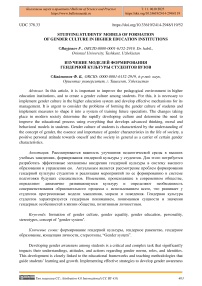Studying Students' Models of Formation of Gender Culture in Higher Education Institutions
Автор: Bayjonov F.
Журнал: Бюллетень науки и практики @bulletennauki
Рубрика: Социальные и гуманитарные науки
Статья в выпуске: 10 т.11, 2025 года.
Бесплатный доступ
In this article, it is important to improve the pedagogical environment in higher education institutions, and to create a gender culture among students. For this, it is necessary to implement gender culture in the higher education system and develop effective mechanisms for its management. It is urgent to consider the problems of forming the gender culture of students and implement measures to shape it into a system of training future specialists. The changes taking place in modern society determine the rapidly developing culture and determine the need to improve the educational process using everything that develops advanced thinking, moral and behavioral models in students. Gender culture of students is characterized by the understanding of the concept of gender, the essence and importance of gender characteristics in the life of society, a positive personal attitude towards oneself and the society in general as a carrier of certain gender characteristics.
Formation of gender culture, gender equality, gender education, personality, stereotypes, concept of "gender system"
Короткий адрес: https://sciup.org/14133969
IDR: 14133969 | УДК: 378.33 | DOI: 10.33619/2414-2948/119/52
Текст научной статьи Studying Students' Models of Formation of Gender Culture in Higher Education Institutions
Бюллетень науки и практики / Bulletin of Science and Practice
UDC 378.33
Developing gender awareness among students is a critical and complex task that significantly impacts their understandings, attitudes, and actions regarding gender norms, roles, and identities. This development is closely linked to the educational frameworks and teaching methodologies that guide students’ learning and growth. Implementing effective strategies to develop gender awareness among students requires weaving gender-related themes throughout the curriculum, using teaching methods that respect all gender identities, and fostering a school environment that is inclusive and equitable [1].
Key approaches include:
-
- Curriculum Enhancement: Gender studies and the integration of inclusive perspectives across disciplines can help students develop a deeper and more nuanced understanding of gender issues.
-
- Inclusive Language and Resources: Using gender-neutral terminology and selecting educational resources that represent a wide range of gender identities and narratives.
-
- Critical engagement: encouraging students to critically examine and question gender norms and stereotypes through discussions, debates, and reflective exercises.
-
- Empowerment and advocacy: Creating opportunities for students to promote gender equality and to work against gender-based prejudices and violence.
Recognizing that many gender stereotypes are deeply rooted in historical and cultural narratives, the education system is evolving to prioritize gender equality. However, contemporary art and subcultures are introducing new perspectives that significantly influence our worldview and challenge traditional values [2].
This shift highlights the need for innovative, gender-sensitive educational and training technologies. In this regard, the introduction of advanced information technologies in education is essential. The efforts of women scholars in our country are increasingly focused on the use of IT to improve the content and delivery of education. It is widely recognized that the use of Internet technologies and computer tools in public, secondary, and higher education institutions not only improves the quality of education, but also solves the problem of fully engaging students through increasingly complex traditional teaching methods [3-5].
The implementation of a gender approach in the higher education system involves increasing the sensitivity of all components of the educational process, namely educational, training (content of education) and methodological (teaching methods, organization of the educational process, pedagogical cooperation), as well as organizational and pedagogical conditions, and the management of the education system to gender issues. Education is an important factor in social relations. Education develops the potential of boys and girls, enables women and men to participate in the social, economic and political life of the state, and is the foundation for the development of a democratic state. Through education, ideals of tolerance for cultural, political, ethnic, religious and gender diversity are formed in society. Often, discussions about gender equality in education are limited to discussing gender parity: for example, if boys and girls are given the opportunity to enter higher education, then gender equality in education is considered to be achieved. However, ensuring gender equality in education is a broader concept than ensuring gender priority.
The pedagogical framework for the formation of gender culture among students in higher education institutions offers various opportunities and challenges. These foundations are crucial in shaping students' understanding and attitudes towards gender norms, roles, and identities. The opportunities and challenges inherent in this educational activity are outlined below [6].
Also, pedagogical research aimed at shaping gender culture in students presents both wonderful opportunities and important tasks. Opportunities include promoting gender equality, developing critical thinking, expanding students’ opportunities, creating a supportive environment, and preparing students for a diverse society. Conversely, challenges include resistance to change, the need for teacher training and resources, managing sensitive discussions, ensuring inclusion, and balancing curriculum demands. Students’ mobility, creativity, agility, talent, open-mindedness, reflection, risk-taking, and unique and common qualities should serve as the basis for determining social status and status, not their gender [7-9].
In conclusion, while reforms and pedagogical strategies in higher education in Uzbekistan demonstrate a progressive approach to gender equality and holistic education, addressing the challenges will require continued dedication, innovation, and collaboration between educators, policymakers, and the public. Successfully overcoming these obstacles is critical to raising a knowledgeable, compassionate, and inclusive future generation.


